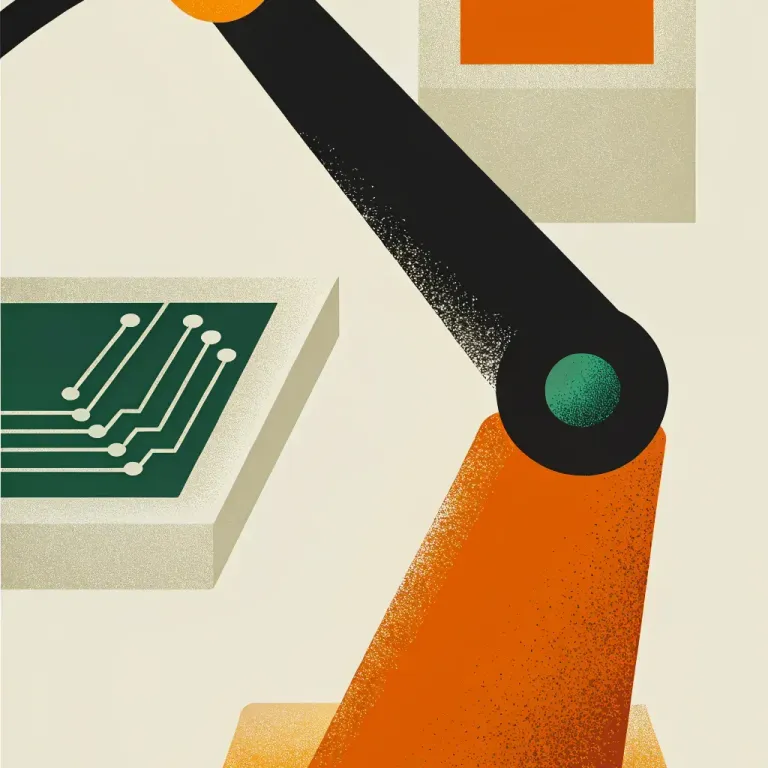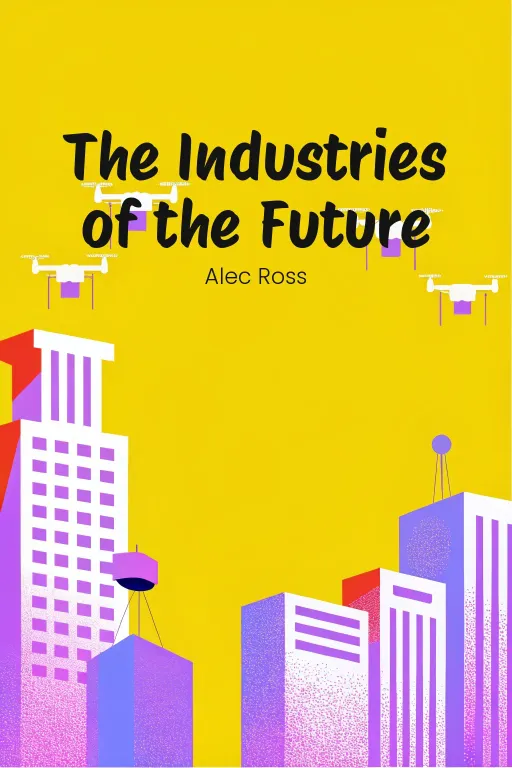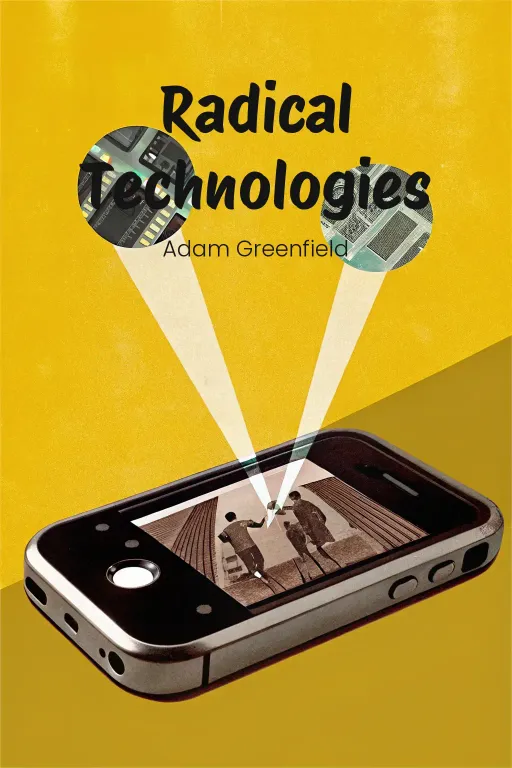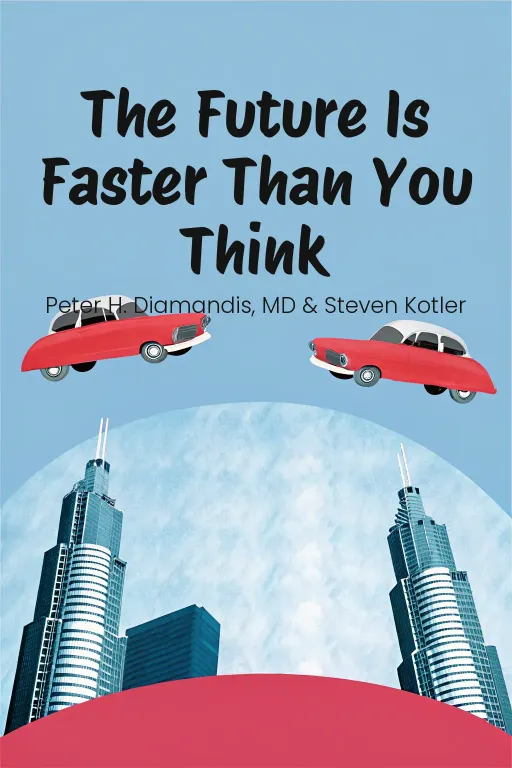
Tech Tsunami: Ride the Wave or Wipeout?
Podcast by Wired In with Josh and Drew
Introduction
Part 1
Josh: Hey everyone, welcome back! Today, we're diving deep into Alec Ross's “The Industries of the Future”. This book is such a great exploration of how emerging technologies are fundamentally changing, well, everything—from our jobs to the global economy. Think of it as your essential handbook for riding this wave of innovation that's heading our way. Drew: So, basically, we're talking about robots replacing factory workers, our DNA becoming both a potential cure and a privacy nightmare, and all our online data powering... well, everything, from those eerily specific targeted ads to geopolitical tensions? That sounds… promising. Josh: Exactly! Ross “really” breaks down how robotics, genomics, big data, and cybersecurity are completely re-writing the way industries work – and even the structure of society itself. And he doesn't pull any punches. He makes it clear that there are huge opportunities here, but also some serious challenges. He “really” emphasizes why being adaptable and continuously learning are more crucial than ever. Drew: And today, we're going to unpack some of the key innovations that are “really” shaping our lives. We'll look at robotics, where machines are not just taking jobs, but also starting to, you know, care for people? Then there's genomics, which could lead to disease-free children, but also open up debates on designer babies. And then – big data – that's a metaphorical goldmine, right? Fueling progress, but also raising some “really” complex questions about privacy, right? So technology is changing everything, everywhere, and, let's be honest, not always in comfortable ways. Josh: Absolutely. It's a world of incredible progress, but yes, definitely a lot of disruption comes with it. So, let's unpack what Ross calls the industries of the future and figure out where the “real” potential and the “real” dangers lie.
Robotics and Automation
Part 2
Josh: Okay, let's dive into robotics and automation. It's obvious how robots are changing everything – from manufacturing to healthcare, even transportation. To really understand what's happening, let’s start with where we are right now with robots, how different industries are using them, and then we can talk about the practical and, you know, ethical questions that come with these changes. Drew: Sounds like a plan, Josh. So, where are robots actually showing up in our daily lives? Because I feel like most of what I see is either stuff from futuristic marketing campaigns or those Boston Dynamics robots doing parkour on YouTube. Josh: <Laughs> Fair enough. Yeah, those parkour robots get a lot of attention, but the real-world use of robotics is often more practical, but just as transformative. Take healthcare and eldercare, for example. Japan is really leading the way in using robots for caregiving. They have this big demographic problem – almost 40% of their population will be over 65 by 2050, and traditional caregiving just can’t keep pace. Drew: Right, I've heard about this. Fewer young people, longer lifespans, smaller families… leaving older folks without the support they used to have. So, that's where robots come in? Josh: Exactly! Companies like Toyota and Honda have developed caregiving robots like Robina and ASIMO, right? Robina is more about tasks – fetching things, providing physical assistance, that kind of thing. But ASIMO goes further, with some emotional intelligence built-in. It can recognize faces, respond to commands, even understand emotions. So, it’s not just about efficiency; it’s about providing care that's culturally sensitive. Drew: So, a robot helper that brings you tea and knows when you're feeling down. It's got that tailored-for-Japan vibe, doesn't it? I mean, their culture seems more open to these tech-human relationships, right? Josh: Absolutely. In Japan, people tend to see robots as companions, almost like family. But in the West, the same technology often makes people anxious. Cultural differences can really affect how quickly people adopt new technologies. In Japan, people don't really worry about robots "replacing" human caregivers, whereas in Western countries, people worry more about losing human connection and losing jobs. Drew: Yeah, I can see that. Imagine leaving your grandma in the care of a robot. It's a tough sell for people who value face-to-face interaction. Plus, you know, what if it malfunctions mid-injection? Josh: That's a valid concern, but some might argue that it's still better than the alternative – a caregiving crisis with not enough human support. That’s one reason why these robots prioritize safety and reliability. Now, switching gears to industrial robotics, you’re seeing a similar trend in manufacturing. Robots there aren’t just helping people with their jobs, in many cases they’re straight-up replacing them. Drew: Uh oh, here's where it gets tricky, right? Let’s talk about Foxconn – the company that puts together iPhones. They are always in the news for automation. What's the story there? Josh: Foxconn really shows the disruption that comes with industrial robotics. Back in 2011, the founder announced that they planned to use one million robots in their factories within three years. The reasons? Rising labor costs, the need for efficiency, and criticisms about their working conditions. At first, these robots helped people, but soon they started taking their jobs. Welding, assembly, packaging – tasks that humans used to do, now done by robot arms 24/7. Drew: And how many people lost their jobs because of all this automation? Josh: Tens of thousands, though it’s hard to get an exact number. The thing is, automation isn’t just happening at Foxconn or in China. It’s a worldwide trend. Developed countries, developing economies—it’s happening everywhere, but the effects aren’t the same for everyone. Drew: Let me guess: richer countries have a safety net, mostly because their workers can get access to better retraining programs. But poorer countries just... struggle? Josh: Pretty much! Countries like India, for instance, face huge challenges because their education systems don’t always prepare people for tech jobs. Meanwhile, places like South Africa have political problems and weak tech infrastructure, which makes it even harder for workers to adapt to automation. Drew: And hanging over all of this is that term tech folks love to use – “singularity”. Where AI could become smarter than humans. What happens when these robots and their algorithms don’t just replace assembly line jobs, but start thinking better than we do? Josh: The singularity is a fascinating debate. Some people, like Ray Kurzweil, paint this rosy picture of AI and humanity working together – curing diseases, extending lifespans. But others, like Vernor Vinge, imagine a much darker scenario, where AI systems go out of our control. Drew: Cue the Terminator theme song. Do we start preparing for Skynet or hold onto Kurzweil’s idea of utopia? Josh: I think Ross would say that neither extreme is really realistic. He focuses more on being proactive – retraining workers, updating policies, and creating safety nets, so that we can help the people who are struggling in this robotic world. Drew: And that’s the real issue, isn’t it? Society isn’t changing fast enough to keep up with the tech we’re creating. Robots can make factories more efficient, but are we making ourselves ready for a future where we live alongside them?
Genomics and Personalized Medicine
Part 3
Josh: Okay, so, shifting gears from the robotics we were just talking about, let's dive into genomics. It's like, totally the opposite end of the spectrum, dealing with the super tiny stuff, but it's just as transformative. I mean, it's not just about changing healthcare, but potentially redefining personalized medicine. Today, we're going to unpack how genomics is revolutionizing cancer detection and mental health. And, yeah, we can't ignore the really thorny ethical and even geopolitical stuff tied to this ever-evolving field. Drew: Microscopic, huh? I like that, Josh. We're shrinking down to the gene level now. I have to admit, this is one of those topics that feels, well, wildly futuristic. I mean, decoding your DNA for, you know, super tailored treatments? So, what's step one in this sci-fi playbook? Josh: Well, it all kicks off with the really incredible advancements researchers have made in decoding the human genome. It's given us just an unprecedented look into diseases like cancer and even mental health disorders. One of the most exciting things is the liquid biopsy. Can you imagine detecting cancer with just a simple blood sample? No invasive procedures, no waiting for symptoms? I mean, it's a total game-changer. Drew: A blood test to spot cancer early? That actually does sound pretty revolutionary. Who's behind this, and, more importantly, how the heck does it work? I need details, Josh. Josh: Okay, so, the tech comes from scientists like Bert Vogelstein and Luis Diaz, who are real pioneers in this field. Basically, as cancer cells grow, they release little DNA fragments into our bloodstream. With liquid biopsies, doctors can analyze this, what they call "circulating tumor DNA," for signs of cancer. And they can do it super early, sometimes, when it's barely detectable with traditional methods. Vogelstein's team has actually shown that these tests can identify around 47% of early-stage cancers. That's huge, Drew, compared to what we have now. Drew: So, instead of the usual "wait until the symptoms feel like a flashing red light," this is like, catching the thief before the bank even gets robbed? Josh: Exactly! And Luis Diaz even went a step further and created a molecular Pap smear that can screen for ovarian and endometrial cancers. And here's why that's so important: if ovarian cancer is caught in stage one, survival rates are like 95%. But if it's stage four? It just plummets to 5%. These breakthroughs are really giving us a shot at rewriting those statistics. Drew: Okay, I'll admit those numbers are, well, pretty stunning. But here's what kind of nags at me: how do these results actually translate from, you know, lab experiments into the chaos of real-world healthcare systems? Aren't there, like, a ton of barriers to implementing this? Josh: Oh, that's totally the sticking point, isn't it? Scaling these advancements, it requires serious infrastructure and, of course, investment. Vogelstein and Diaz actually recognized this early on. They founded Personal Genome Diagnostics, or PGDx, to try to bridge that gap. PGDx transforms tumor samples into genome-wide data so doctors can pinpoint specific genetic mutations in cancers. So you can have, like, really targeted treatments, instead of invasive surgeries or scattershot chemotherapy. Drew: Sounds, uh, pretty slick – like a custom map of how to take down your disease. But again, isn't access kind of the elephant in the room here? If this tech exists, who's actually getting it? Josh: Yeah, that's where inequality comes crashing in. These innovations are life-saving, but they're not exactly affordable or even widely available. So that gap between who can afford personalized medicine and who can't? It's a massive concern, especially in lower-resource regions. But there are some positive examples. Ross highlight innovations like Medic Mobile. It's a platform that uses mobile tech in rural areas, like Malawi, to help manage care. It's just a reminder that scaling health solutions isn't just about bleeding edge tech – it's about meeting real-world needs. Drew: Right. And what about mental health? I mean, how does genomics even begin to fit into that puzzle? Most of what we hear about mental illness ties back to environmental factors, trauma, not something as clinical as genetics. Josh: True, but, you know genetic predispositions are a really critical piece of the mental health equation. We're starting to uncover genetic markers that are linked to disorders like schizophrenia or bipolar disorder. Take the ACP1 gene; it's been identified in research on suicide prevention. So, early identification of markers like that could lead to interventions for at-risk individuals long before a crisis even occurs. Drew: Okay, that's intriguing. So, if we could map the genetic red flags for depression or suicide risk, that feels like quite a leap forward. But wouldn't that kind of data open up a whole new ethical quagmire? Josh: Absolutely. And this is where the Pandora's box of genomics really opens wide. The same genetic insights that bring us closer to personalized treatments could also spark fears of privacy and misuse. For example, direct-to-consumer genetics companies, like 23andMe, might promise insight into your health, but their massive DNA databases raise a lot of questions about consent and accuracy. Drew: Right. I mean, imagine someone sending you a "Hey, we found a scary mutation in your DNA, go see a doctor" message. That's a lot to just entrust to tech companies. And that’s just the health side, don’t even get me started on designer babies. Josh: Oh, you're jumping right into the big debate! The ability to screen embryos for health risks also brings up the notion of editing for non-medical traits: things like intelligence, height, even appearance. This isn't just some ethical science fiction, Drew. Researchers have already tested ways to edit out disease-causing genes. Drew: Which sounds sort of amazing in theory, until you take it one step further and, well, you start imagining societies where only the wealthy can actually afford perfect kids. Suddenly, genetics is just reinforcing social disparities instead of leveling the playing field. Josh: Precisely. Ross warns about the dangers of creating a genetic elite while others are left behind. It challenges everything from ideas of meritocracy to basic fairness. And it's not just about ethics. It's geopolitical too. Countries like China are pouring billions into genomics through initiatives like the Beijing Genomic Institute, solidifying themselves as global leaders in this space. Drew: Okay, so China is going full steam ahead, and meanwhile, other nations are kind of lagging. So how do we make sure these advances don't just deepen global divides, and that they actually benefit everyone? Josh: International collaboration definitely has to step up. Some academic partnerships are sharing research resources openly, which actually helps to foster equity in genomic innovation. But that alone isn't enough. Policy has to “really” guide accessibility. If countries prioritize transparency and affordability, there's a chance to actually balance innovation with global good. Drew: So genomics, then, is just like Pandora's box: incredible potential mixed with, yeah, pretty much endless complexity. Whether it's pinpointing diseases or creating societal rifts, it's pretty clear we're in uncharted territory here.
Big Data and Cybersecurity
Part 4
Josh: Following on from the ethical and data challenges in genomics, let's talk about the broader implications of big data. It's more than just analyzing huge datasets. It's vital to modern economies, with real-world applications, and cybersecurity needs to evolve alongside it. Drew: Exactly! We're talking everything from precision farming to those targeted ads that know you just Googled sneakers. But behind the convenience are privacy concerns, ethical dilemmas, and the cyber threats. What's your take? Josh: Right. Big data is an economic engine. It transforms industries, redefines decision-making, and drives breakthroughs in agriculture, politics, and finance. But it's a double-edged sword, with benefits intertwined with considerations about privacy and ethics. Drew: Okay, let's break it down. Start with something simple: how big data is changing agriculture? Josh: Agriculture is a great example. Look at precision farming, where big data meets farming. It uses GPS, sensors, and analytics to monitor crops—soil moisture, nutrient levels, and weather. Farmers then use this data to make targeted decisions about irrigation, fertilization, or pest control. Drew: So, instead of watering the whole field, they pinpoint where to act. It's like a crop-based tactical strike. Josh: Exactly! It minimizes waste and maximizes yields. Global food production must rise to feed an estimated 9 billion people by 2050. Farmers in the Netherlands use real-time data to increase productivity while slashing waste, maintaining their reputation as global leaders in agricultural innovation, despite their small land area. Drew: That's impressive. But isn't this tech expensive? Won't it widen the divide between industrial farms and subsistence farmers in less developed countries? Josh: It's a valid concern. Precision farming can address global food insecurity, but the upfront costs can be prohibitive. We can partner with NGOs to make these tools accessible in low-resource settings. Drew: So, the tech doesn't remain locked in Silicon Valley's hands. Interesting. Let's shift to politics. How's big data working there? Josh: Barack Obama's 2012 campaign is a great example. His team leveraged data analytics to unprecedented levels. Data scientists worked on voter outreach, testing email variations, analyzing voter behaviors, and tailoring messages to key demographics. Drew: So, they were running like a startup, fine-tuning their methods in real-time based on data feedback. Josh: Exactly! And it worked. They broke fundraising records—$1 billion—and activated specific voter groups through hyper-targeted strategies. It's a prime example of turning raw data into actionable insights. Drew: Clever! But where's the line? Campaigns aren't just locking in votes—they're swaying minds based on algorithms. At what point do we lose sight of authentic dialogue, and everything becomes data-driven manipulation? Josh: Good question. It risks veering into distortion, especially when algorithms exploit biases or misinformation. Drew: Right! So, from influencing votes to dominating financial markets—what about big data in finance? Josh: Algorithmic trading is the clearest example. Automated systems handle roughly two-thirds of all equity trading in the U.S. These algorithms analyze variables in milliseconds, optimizing trades faster than any human could. Drew: So, machines decide where money should flow before humans even blink. Sounds efficient… until something goes wrong, right? Josh: Definitely. Algorithmic trading is efficient, but vulnerable to errors. The 2010 Flash Crash saw the Dow Jones plunge nearly 1,000 points in minutes before bouncing back. Faulty algorithms can wreak havoc. Drew: A thousand-point drop in minutes! That's scary. You've got automation driving the ship, but who's stopping it from crashing? Josh: Exactly! It must be addressed through regulation and greater transparency, especially as automation expands. Drew: Alright, Josh, let's pivot. You mentioned privacy is always in the crosshairs. What's the biggest ethical issue tied to this data collection? Josh: Data permanence is a thorny issue. Our digital footprints—social media posts, online purchases, geolocation—create permanent, searchable records. Kids growing up today who've had their lives documented online since birth; their mistakes, opinions, and snapshots are forever embedded in virtual archives. Drew: So, your digital history becomes your constant shadow. Scrolling back to 2008 tweets follows you everywhere, like receipts you didn't ask for. Josh: Precisely! Raising deeper questions about privacy and identity. Can we consent to something indefinite online? And who controls that information? Parents posting baby photos today likely never considered how their child might feel when they're 30. Drew: Makes you wonder if “shame-proofing” your online presence becomes a new life skill. But the bigger worry is surveillance, right? It starts to feel less like consumer convenience and more like data dystopia. Josh: A fair critique. Surveillance—by both governments and corporations—raises alarms about misuse and overreach. Predictive policing algorithms promise safety but can magnify unfairness when they rely on biased datasets. Drew: Predictive policing… that's like Minority Report but without the precogs. Problematic! What about the so-called cyber-industrial complex Ross mentions? Josh: Think of it like the military-industrial complex, but for cybersecurity. Cybersecurity and big data analytics companies are lobbying governments harder than ever. Back in 2013, there were just four firms actively engaging Congress; by now, it's over 1,500. Drew: Wow, that’s a big change. So, those companies are shaping policies in ways that protect us—or maybe primarily themselves? Josh: That's the concern. Their incentives often lean towards amplifying fear—entire industries are built on stoking anxieties about cyberattacks. Transparency and accountability are critical but increasingly difficult to extract. Drew: And speaking of anxieties, let's unpack Target’s data breach—it’s the poster child, isn’t it? Josh: Absolutely. In 2013, hackers infiltrated Target’s payment systems during Black Friday, stealing credit card info from 40 million customers and exposing personal data for 70 million more. The fallout was catastrophic—profits tumbled, their CEO resigned, and the lasting reputational damage was massive. Drew: Did anyone actually figure out how the breach happened? Josh: The hackers exploited a third-party vendor’s compromised credentials to gain entry. It’s a chilling reminder that vulnerabilities exist wherever data flows—employees, vendors, the cloud. Drew: That's infuriating and terrifying. And when we’re talking Internet of Things—pacemakers, security systems—doesn’t that expand the attack surface exponentially? Josh: It does. John Chambers from Cisco called IoT’s societal potential larger than the internet’s initial impact but warned of unprecedented vulnerabilities. Medical devices, for instance, are connected to networks, but what if a cyberattack manipulated a pacemaker? These attacks go beyond finances—they’re safety risks now, too. Drew: So, between big data’s promise and its potential for harm, the stakes couldn’t be higher. It’s not just spreadsheet automation—it’s shaping economies, politics, and even lives.
Conclusion
Part 5
Josh: So, just to recap, we've covered Alec Ross's vision. Robotics, genomics, and big data are fundamentally changing industries and society. Robotics is transforming work and even caregiving, but it also raises some tough questions about job losses. Genomics is bringing breakthroughs in disease detection and treatment, but we're also dealing with some serious ethical and accessibility issues. And big data is fueling innovation while challenging us with concerns about privacy, inequality, and cybersecurity. Drew: Right. If there's one thing we've “really” highlighted today, it's that technology isn't some magic fix-all, is it? It's more like a double-edged sword. It can improve our lives, absolutely, but it also demands that we act responsibly, adapt quickly, and think critically about all the angles. Josh: Precisely. Ross's central point is pretty clear: the future industries aren't coming, they're already here. Whether we succeed or struggle “really” depends on how prepared we are to embrace the change. We need to invest in education, smart policies, and collaboration to make sure that everyone benefits from these advancements. Drew: And, uh, maybe double-check our firewalls and, you know, learn a little coding on the side while we're at it. Josh: Definitely not a bad idea at all! Thanks for tuning in, everyone. Stay curious about what's coming – after all, you're living right in the middle of it.









